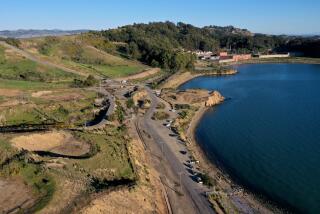Gangs Question Their Exile From Park : San Fernando: Under a unique ordinance, members listed as ‘active’ will be cited for entering Las Palmas. Critics call the move unconstitutional.
The homeboys stood smoking cigarettes outside a house near Las Palmas Park in San Fernando Tuesday--feet splayed in gang poses, thumbs hooked in low-slung pants--and expressed their distaste for a new city law that bans gang members from the park.
“It’s violating some kind of rights,” said a 19-year-old who gave his street name as Toper. “It’s a community park. We’re part of the community. This ain’t a Communist country, it’s a democratic country. Que no ?”
The eight other teen-agers, members of a gang composed of mainly Latino immigrant youths from San Fernando and Sylmar, nodded and muttered assent. One tattooed youth said the gang should sue the city with the help of a personal-injury lawyer well-known on Spanish-language television commercials for his bald head and accented but aggressive Spanish.
“If anybody sues, I’m joining in,” the youth said, and the group erupted in laughter.
But the unique law passed Monday night by the San Fernando City Council is serious business to the city government and many residents. It represents the latest offensive in a campaign to reconquer a park that serves as a kind of giant back yard for the crowded, working-class neighborhood where many of the gang members live.
The recent gang war for control of the park has pitted the newer immigrant gang against a longtime area gang dominated by American-born Latinos, officials said. There have been daily police patrols at the park since a mother and her three children were wounded there during a shootout in July, an incident that sparked outrage in the community.
“People in this little city are fed up,” Police Lt. Ernest Halcon said. “They have had it.”
The law will give police a new tool by enabling them to arrest gang members and issue them a $250 citation whenever they find them in the park, rather than having to station officers in the park continuously to keep an eye on congregated gang members, police said.
San Fernando police were training gang officers Tuesday to begin serving notice about the new park law on gang members designated as “active” under the state’s Street Terrorism and Enforcement and Prevention (STEP) Act, which provides additional penalties for known gang members convicted of crimes.
And city officials were dealing with a flurry of media interest, questions and criticism about enforcing a law that is the first of its kind in the nation and has been criticized as unconstitutional by the American Civil Liberties Union.
ACLU Executive Director Ramona Ripston said Tuesday that her group will study the law and its enforcement before deciding whether to challenge it in court. The ACLU has become a distinctly unpopular group at San Fernando City Hall and police headquarters, where officials were particularly sensitive to assertions that they will be discriminating against “anyone who is Latin and wearing a T-shirt,” as Halcon put it.
Police will target only hard-core gang members who they have been working for months to identify using the STEP criteria, San Fernando Police Chief Dominic Rivetti said. Gang members are formally classified under STEP based on their criminal records, associates, street names, tattoos and other signs of gang involvement, then served with papers notifying them of the classification, he said.
Police will not permit those who are targeted to enter the park, even for sports or other non-gang activities, police said. If a gang member protests that he wants to reform, police will want to see evidence of his good intentions, Rivetti said.
“We would expect to see participation in one of the city’s counseling or monitoring programs,” he said. “Once he’s no longer an active gang member, then he does not fit the ordinance.”
The ordinance should be seen in the context of an ongoing effort to help gang members with home visits to their parents by counselors, offers of job training and other programs, officials said.
“We are not just saying, ‘Get out of here; we don’t want you,’ ” said Parks and Recreation Director Jess Margarito. “We don’t have a right to say that without trying to build a rapport and a relationship. We are trying to integrate them into our programs and services.”
Manuel Velazquez, a northeast Valley counselor for Community Youth Gang Services, said he believes the ACLU and other critics of the law are not in tune with community sentiment.
“They don’t live there,” he said. “The people who should be using the park can’t use it because of these guys.”
On the other hand, Velazquez said, enforcement could prove difficult.
“They have to make sure they do their homework, that guys they label as ‘gang member’ are gang members,” he said. “Is it going to be based on police records, or are they going to be judging a book by its cover?”
More to Read
Sign up for Essential California
The most important California stories and recommendations in your inbox every morning.
You may occasionally receive promotional content from the Los Angeles Times.










